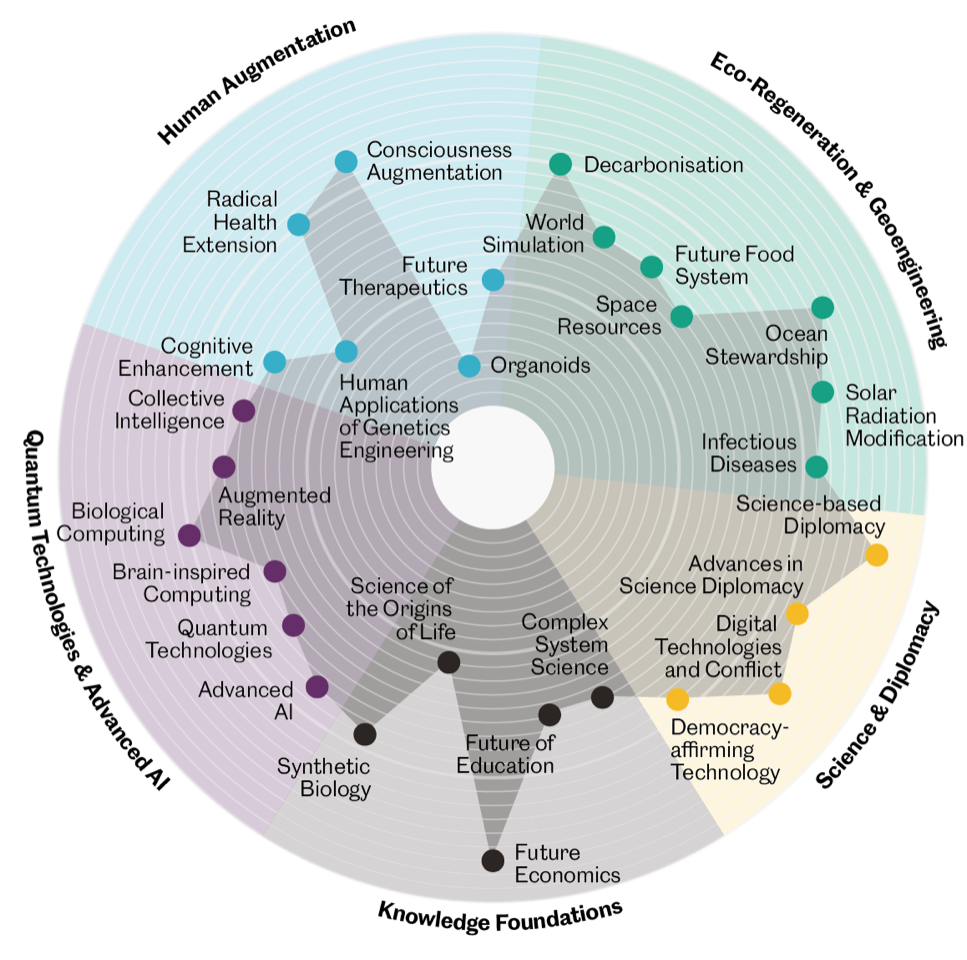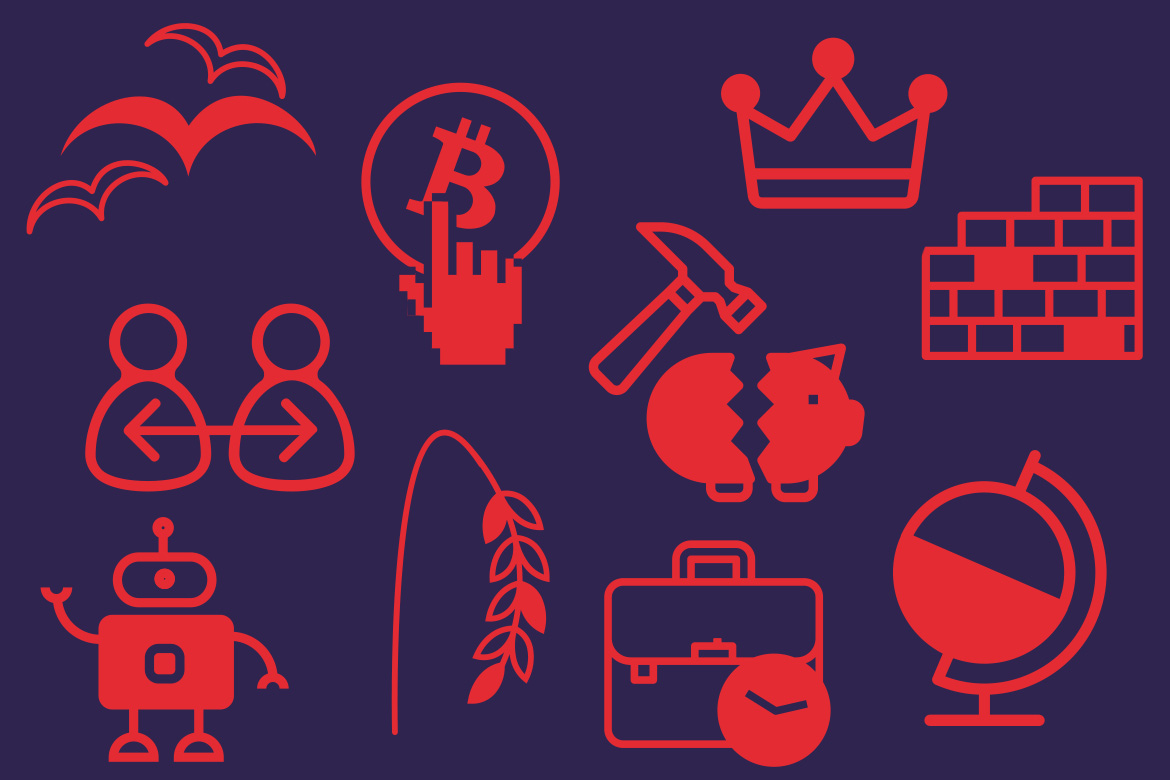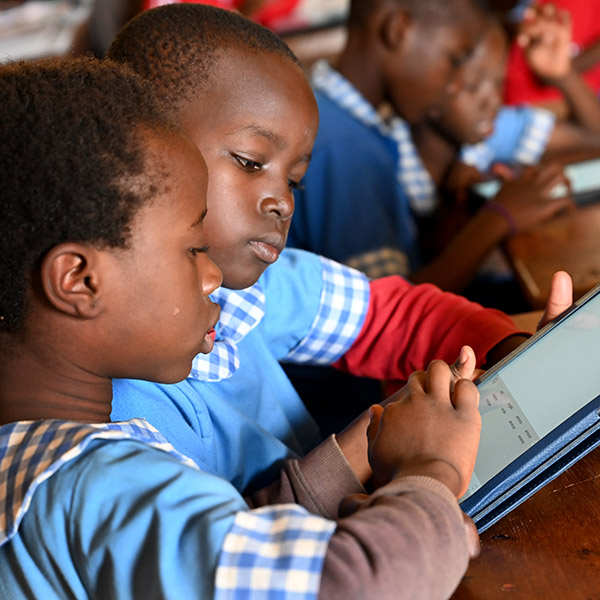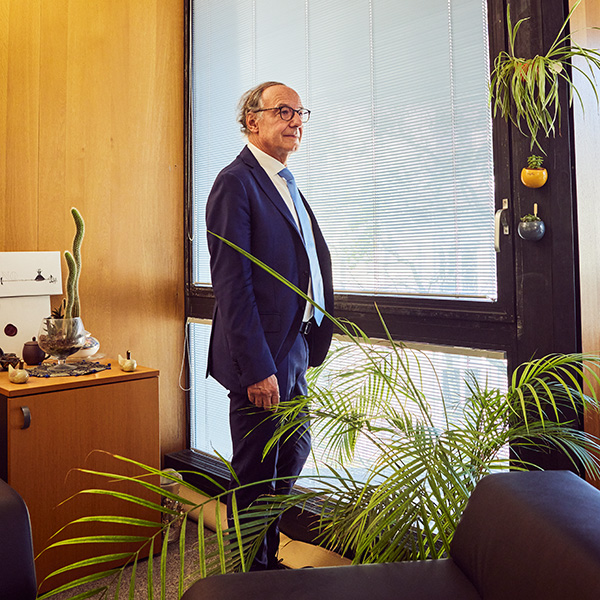SCIENCE AND POLICY
The challenges of scientific anticipation
The Geneva Science and Diplomacy Anticipator is a radar of scientific breakthroughs offering predictions for five, ten and 25 years. It aims to foresee discoveries so that the political sphere can prepare for them.
-
When it’s worth anticipating
More than a thousand researchers from all over the world have completed a survey estimating how long it takes for various research topics to mature, their impact on science and the economy, the degree of awareness of their stakeholders, and the influence that this has on people, society and the planet. When added up and normalised, the result is the anticipation potential, shown here on a scale from 0 to 27.
Graphic: adapted from GESDA Science Breakthrough Radar / Martin Müller
In five years, human memory will be better understood. In ten years’ time, drugs will improve learning abilities. In 25 years, memories will be augmented with implants and brain-machine interfaces. This could transform cognitive freedom and human identity.
These predictions were coordinated by Olaf Blanke, the director of the cognitive neuroscience laboratory at EPFL, for the Geneva Science and Diplomacy Anticipator (Gesda) Scientific Breakthrough Radar. This foundation was created in 2019 by the Swiss Confederation and the Canton of Geneva with the support of the City of Geneva, and it aims to create a place for scientific anticipation in the multilateral system.
“Innovations are accelerating, as are crises”, says Stéphane Decoutère, the secretary general of Gesda. “If we want everyone to benefit from scientific advances, it is essential to anticipate. Because politics is slow. If we wait for discoveries, we risk being caught off guard”.
Gesda wants to avoid harmful uses of technology or monopoly situations like the Internet. “We offer a platform where scientists and diplomats can exchange information”, says Decoutère. The idea was to institutionalise meetings between these two very different worlds.
What’s cooking in the world’s laboratories
In order to monitor the progress of science and “what’s cooking in laboratories around the world”, to use its official terminology, Gesda’s radar presents more than 200 trends with a five, ten or 25 year perspective. To bear this out, the foundation brings together a panel of international experts who identify key areas and make predictions.
The scientific moderators include the computer scientist Steve Furber from the University of Manchester, the biochemist Brian Kennedy from the National University of Singapore and Giulio Tononi from the Institute of Sleep and Consciousness in Winsconsin. During its first edition in 2021, the radar focused on the quantum revolution, the augmented human and eco-regeneration.
Alexandre Fasel is the Confederation’s special representative for scientific diplomacy and is very involved in Gesda. He says that the idea is to aim for a broad spectrum: “In the long term, we want to introduce more disciplines. The idea is to develop a general vision of science. This has not existed until now”.
With its Wikipedia of scientific anticipation, Gesda differs from other think tanks. The latter often specialise in one area of anticipation, making predictions based on scientific studies or predicting the societal impact of new technologies. Alexandre Fasel adds that science diplomacy represents a major trend in the multilateral arena: “There is now a strong desire to give researchers a voice. In this context, the Confederation has also decided to focus on scientific anticipation”.
The need for scientists to anticipate
Diplomats seem happy to listen to what scientists have to say about the future. And the other way round? Blanke did not hesitate when asked to participate in the Gesda predictions: “It is necessary for us to anticipate”.
This is a reference to the rapid development of neurotechnology. The coming interfaces between brain and computer will raise ethical questions. What will be the consequences for the personality, who will be able to benefit from them, what will happen if they fall into the hands of a dictatorship? “We need to discuss these issues today, not ten years from now. We can’t carry these responsibilities alone in our laboratories”.
Blanke admits that anticipation is a challenge: “Take three scientists and you get four opinions... Predicting our results in five years is a much easier exercise than in 25 years, even though most researchers have a long-term view. This does not mean that it will happen. The expectations will be adjusted every year”.
More than a thousand scientists have been mobilised to produce the 2022 edition of the breakthrough radar. That is twice as many as in 2021. Is this proof of the tool’s success? “Ideally, we should have 100,000 participants”, says a smiling Blanke. “There are still many scientists who prefer to close the door of their lab to devote themselves entirely to their research. This is often necessary to advance science. All the steps taken to discuss one’s discoveries publicly are time-consuming. But they are still necessary”.
No anticipation is neutral
Moreover, anticipation is a risky exercise. “Most scientific predictions will not come true as expected”, says Johan Rochel, a co-founder of the Ethix ethical innovation laboratory in Zurich. “This does not mean that we should give up anticipating: in this field, the approach counts more than the result. However, it is important to be aware that anticipation is never neutral and that it’s subject to bias”. There are several methods of anticipation, all of which have their strong and weak points.
Gesda uses the cross-checking method: it asks many people for their opinion and then finds a common denominator. The predictions are then reviewed by scientific moderators. “This method runs the risk of ignoring divergent and minority opinions”, says Rochel. “If you want to know what is being cooked in the best laboratories, you also run the risk of only finding white, male, 50-year-old, Western academics. Their vision of the future will be different from that of a young Chinese scientist”.
In order to anticipate ‘well’, it is therefore necessary to include individuals who are as different as possible in terms of their school of thought, nationality, age, gender, political system, religion or even hierarchical level. “This diversity is probably still a weak point in Gesda”, says Rochel, who co-authored a paper for Gesda on the challenges of ethical foresight.
Gesda’s managers are aware of this. “We should not forget that the foundation was created three years ago. Another point is that most scientists are not paid for their contributions: this excludes de facto those who cannot afford it”.
A crucial element in any scientific anticipation is also to avoid the idea of inevitability. “It would be wrong to say ‘this is how it will be in 25 years’”, stresses Rochel. “It would even be dangerous because every scenario has a power over the present. We must remain modest, and this is the case with Gesda”.
Gesda’s aim is to identify universes of possibilities and as many potential points of development. The foundation’s position is indeed to describe what is being done in the laboratories and the breakthroughs that could emerge. The fact remains that scientific anticipation represents a powerful narrative that can dictate a political agenda. “We need the art of diplomacy and a platform like Gesda if we are going to avoid imposing a single narrative and instead open up a whole spectrum of different possibilities”, says Rochel.
Convincing the players in the multilateral system
Anticipating in the scientific field can have its pitfalls. By involving ethicists and philosophers from the outset, Gesda has succeeded in keeping away from an overly rigid vision of the future. Nevertheless, this young foundation faces challenges: in the next few years, it will have to increase its diversity and the scope of the fields it covers, by including the humanities in particular. Above all, it will have to convince the players in the multilateral system of the importance of scientific anticipation.
“This aspect is crucial”, says Fasel. “Indeed, international politics usually focuses on present crises. We want to direct its attention towards perspectives of up to 25 years. This is not amongst its habits”. He believes in the potential of this foundation: “Of course, we are not going to predict or solve everything with this tool. But I am convinced that this is an initiative that will have a lasting impact”. And if, in 25 years’ time, some of us are to move to Mars, we should perhaps start thinking about that now.





